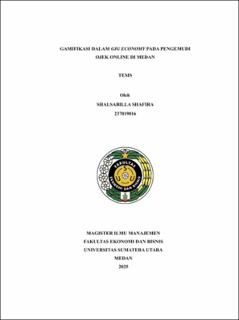Gamifikasi dalam Gig Economy pada Pengemudi Ojek Online di Medan
Gamification in the Gig Economy Among Ride-Hailing Drivers in Medan

Date
2025Author
Shafira, Shalsabilla
Advisor(s)
Dalimunthe, Ritha F
Harahap, R Hamdani
Metadata
Show full item recordAbstract
Gamification has become a key strategy used by ride-hailing platforms to manage and control driver behavior through missions, points, levels, performance metrics, ratings, challenges, and rewards designed to increase driver engagement. This study explores in depth how gamification mechanisms affect the working conditions of Gojek and Grab drivers in Medan. Using a qualitative research method with an interpretivist phenomenological approach, data were collected through in-depth interviews with 16 online motorcycle taxi drivers and analyzed using Nvivo12 software. The findings reveal that platform-driven gamification establishes an unequal power relation between companies and drivers, granting platforms significant control over work processes and mission access, which directly impacts drivers' earnings. Of the four decent work indicators, only job information transparency is met, as provided by the platform via the application. Meanwhile, driver income remains unstable and often falls below the district/city minimum wage (UMK), due both to the gig economy's nature and gamification systems that favor drivers with higher account levels. Additionally, drivers are required to work extremely long hours-averaging 14 hours per day- and face unsafe working environments, particularly the risk of street crime in Medan. Gamification creates high work pressure, income uncertainty, and dependency on the platform, undermining the gig economy's claims of worker freedom and revealing signs of covert exploitation. These findings highlight the urgent need for government regulation to reduce driver vulnerability caused by unilateral gamification mechanisms and unequal power relations between platforms and workers.
Collections
- Master Theses [1243]
